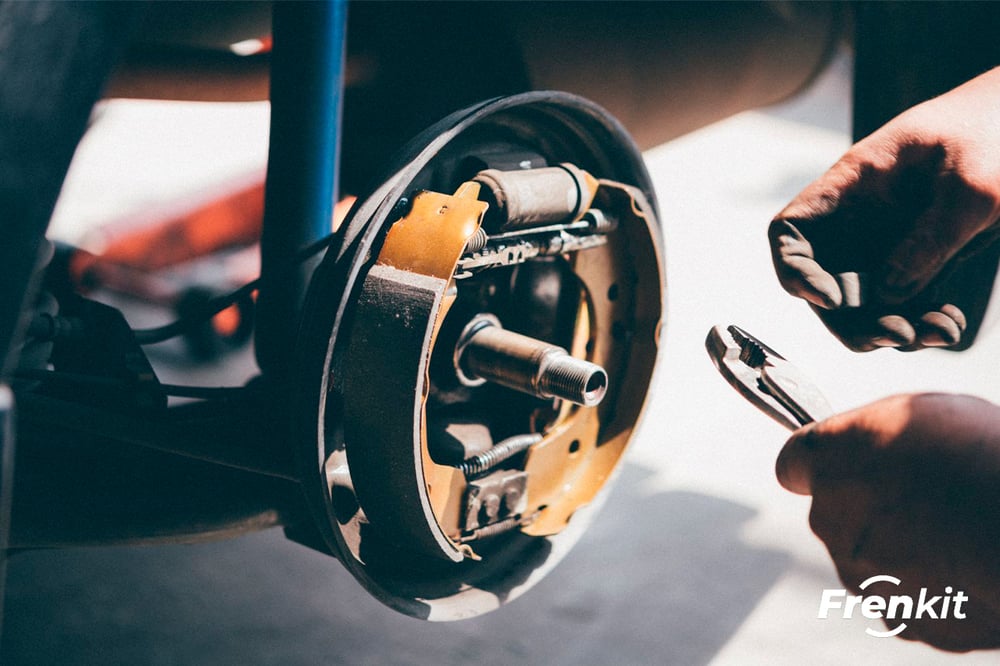
Drum brakes have become an indispensable part of any vehicle's braking system, as they are perfectly adapted to both highways and back roads, as well as adverse weather conditions.
This mechanism, designed in 1902 by Louis Renault, makes it possible to reduce the speed of the car when we want to stop in a simple and effective way, has a larger friction surface than disc brakes, not to mention its lower cost.
However, although there are many advantages of drum brakes, there may be certain circumstances that force us to change this braking system in order to drive safely.
If you want to know more about when do drum brakes need to be replaced and how often to do it, don't miss this post by Frenkit!
When to change drum brakes
Unlike disc brakes, drum brakes do not wear as frequently. This is one of the major differences between the disc brake and the drum brake. However, it is sometimes necessary to have them checked to see if they are working properly. When replacing the drum brake, it is more likely that we will have to replace the drum brake shoes with new ones, since it is the part that suffers directly the effects of friction when braking.
Another reason why we should frequently check our car's brake system is because, in drum brakes, wear cannot be seen with the naked eye. In addition, if we notice that our vehicle takes a long time to stop or we have to press the brake pedal very hard, it is important that we take our vehicle to a specialized mechanic workshop to have it checked.
5 indicators for checking drum brakes
Something that has become clear to us by now is that the brakes of the car are of vital importance, as they are an essential element if we want to stop driving, for this reason, a system in poor condition is, most likely, synonymous with an accident.
Therefore, from Frenkit we have selected some of the most common indicators for which it is advisable to replace or change the drum brakes of our car:
Noises and vibrations when braking
When a vibration or noise is produced when braking the vehicle, it is due to deformation or irregular wear of the drum brake.
This wear can vary depending on the type of driving of each driver and the maintenance that is being given to the car. Not changing the brake shoes when necessary or driving with drum brakes are clear examples of wear.
Hard brake pedal
When we notice that the brake pedal of our vehicle is hard, it may be because the belts of the feed pump are loose or the valves are defective, among other things.
A breakdown in the brake system of our car is something dangerous. Therefore, if we do not know the reason why it is difficult to operate the brake pedal, from Frenkit we urge you to go to a garage as soon as possible for a professional to check the system.
Burning smell when the brake pedal is pressed
When we brake very hard and smell smoke in our car, it is an indicator that the drum brakes or brake shoes are overheating. If this circumstance occurs, it is of vital importance to take the car to a specialized workshop where it can be checked.
In addition, one of the things you should check if you notice this burning smell is the parking brake or emergency brake. Sometimes, this mechanism can get stuck in its locked position, thus burning the brake shoes with the action of the rotating drum.
Too long braking distance
For correct and effective braking, it is necessary that the force transmitted to the braking system is adequate, so that both the internal mechanism and the brake fluid are essential. At the same time, it is important that the set of brake shoes inside the drum brakes is properly cared for.
Spongy brake pedal
If we notice that the brake pedal is soft or spongy, it is a good time to check the drum brakes. It can happen for several reasons: deterioration of the brake fluid, air in the drum brakes, leakage in the brake system circuit or that the brake cylinders and pumps are damaged, for example.
Although there are several causes, the most common is that the brake fluid is in poor condition and does not transmit the necessary pressure for the vehicle to stop. For this reason it is essential to replace it every 2-4 years, something that manufacturers recommend and that many drivers are unaware of.
Now that you know some of the most common symptoms for which to replace and repair your vehicle's drum brakes, we encourage you to also perform good maintenance on your car's drum brakes.
Whether you are a professional in the automotive sector or if you decide to change your car's drum brakes yourself, at Frenkit we are a brake components manufacturer for all ranges of vehicles, both passenger cars and light vehicles.
What did you think of this post?


![[Find out the differences between drum brakes and disc brakes]](https://no-cache.hubspot.com/cta/default/7520036/2be26d8a-7b6d-4779-b68d-159998493aa4.png)
